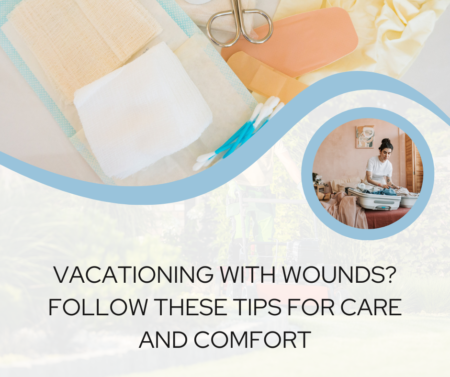 The holiday season is upon us, and for many of us, that means packing our bags and traveling to visit loved ones or to enjoy a much-needed vacation. But for those who are dealing with wounds, whether from surgery, injury, or a chronic condition, this can be a stressful time. How do you continue to care for your wounds while away from the comforts of home? In this blog post, we’ll discuss some tips for managing and caring for wounds while on vacation, so you can enjoy your holiday without any added worries.
The holiday season is upon us, and for many of us, that means packing our bags and traveling to visit loved ones or to enjoy a much-needed vacation. But for those who are dealing with wounds, whether from surgery, injury, or a chronic condition, this can be a stressful time. How do you continue to care for your wounds while away from the comforts of home? In this blog post, we’ll discuss some tips for managing and caring for wounds while on vacation, so you can enjoy your holiday without any added worries.
Recognizing Different Types of Wounds
When it comes to wound care, it’s important to understand that not all wounds are the same. Recognizing different types of wounds can help you determine the appropriate care and treatment. Some common types of wounds include surgical incisions, lacerations, abrasions, puncture wounds, and pressure sores. Surgical incisions typically require sutures or staples and may need special care to prevent infection. Lacerations, abrasions, and puncture wounds may require cleaning with mild soap and water and applying an appropriate dressing. Pressure sores, on the other hand, are often caused by prolonged pressure on the skin and require regular repositioning and the use of special cushions. Understanding the specific characteristics and needs of your wound will ensure that you can provide the necessary care while enjoying your vacation.
The Basics of Wound Care: Cleaning and Dressing
Proper wound care is crucial for promoting healing and preventing infection. When it comes to cleaning and dressing your wounds while on vacation, there are a few basics to keep in mind. First, always wash your hands thoroughly with soap and water before touching your wound. Use a mild soap to clean the area around the wound gently, removing any debris or dirt. Avoid using alcohol or hydrogen peroxide, as they can be too harsh and delay healing. After cleaning, apply an appropriate dressing to protect the wound and keep it clean. This may include adhesive bandages, gauze pads, or specialized dressings depending on the type of wound. Remember to change the dressing regularly and keep an eye out for any signs of infection, such as increased redness, swelling, or pus.
Special Considerations for Travelers: How to Pack a Wound Care Kit
When you’re traveling with wounds, it’s essential to be prepared with a well-stocked wound care kit. Here are some special considerations for travelers on how to pack a wound care kit. First, make sure to include an adequate supply of sterile dressings, adhesive bandages, and wound cleansers. Consider using travel-sized versions of these items to save space. It’s also helpful to pack a small bottle of hand sanitizer to ensure clean hands before tending to your wound. Additionally, include any prescribed medications or ointments specific to your wound. Lastly, don’t forget to pack a small first aid guide or instructions for reference.
Staying Comfortable While Healing: Tips and Tricks
As you navigate through your holiday with wounds, staying comfortable while healing is essential. Here are some tips and tricks to help you enjoy your vacation to the fullest. First, make sure to pack comfortable clothing that won’t irritate your wounds. Loose-fitting, breathable fabrics can help minimize discomfort. Additionally, consider bringing a travel-sized pillow or cushion to provide extra support and relieve pressure on your wounds. It’s also crucial to listen to your body and rest when needed. Don’t push yourself too hard and remember to take breaks throughout the day. Finally, staying hydrated and eating a balanced diet can aid in the healing process.
When to Seek Medical Help During Your Travels
It’s important to know when to seek medical help for your wounds while traveling. While you may be able to manage minor wounds on your own, there are situations where professional medical attention is necessary. If you notice any signs of infection, such as increased redness, swelling, warmth, or the presence of pus, it’s important to seek medical help. Additionally, if your wound is not healing properly or if you experience severe pain or bleeding, it’s best to consult a healthcare professional. Trust your instincts and don’t hesitate to reach out for medical assistance if you have any concerns. Your health and well-being should always be a top priority, especially while traveling.
